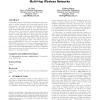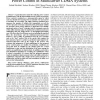234 search results - page 37 / 47 » A polynomial-time nash equilibrium algorithm for repeated ga... |
ICML
2008
IEEE
16 years 13 days ago
2008
IEEE
Quite a bit is known about minimizing different kinds of regret in experts problems, and how these regret types relate to types of equilibria in the multiagent setting of repeated...
MOBIHOC
2008
ACM
15 years 11 months ago
2008
ACM
Channel allocation was extensively investigated in the framework of cellular networks, but it was rarely studied in the wireless ad-hoc networks, especially in the multi-hop ad-ho...
ICDCS
2010
IEEE
15 years 3 months ago
2010
IEEE
—Aspnes et al [2] introduced an innovative game for modeling the containment of the spread of viruses and worms (security breaches) in a network. In this model, nodes choose to i...
123
click to vote
GLOBECOM
2008
IEEE
15 years 6 months ago
2008
IEEE
—Cooperative spectrum sensing has been shown to greatly improve the sensing performance in cognitive radio networks. However, if the cognitive users belong to different service p...
JSAC
2006
14 years 11 months ago
2006
A game-theoretic model for studying power control in multicarrier code-division multiple-access systems is proposed. Power control is modeled as a noncooperative game in which each...


